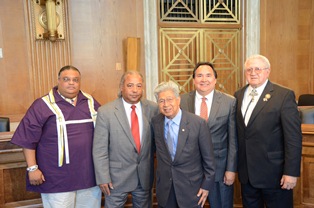WASHINGTON D.C. –
– U.S. Senator Daniel K. Akaka (D-Hawaii), Chairman of the Senate Committee on Indian Affairs, held an oversight hearing on Federal Recognition: Political and Legal Relationship between Governments, today.
 The United States has acknowledged a special relationship and trust responsibility to its indigenous peoples since the framing of the Constitution. Fulfilling that trust responsibility has meant federal action in three basic areas: the provision of support to address barriers to self-sufficiency, the passage of laws to protect the collective rights of Native nations and engagement with Native nations in a government-to-government relationship.
The United States has acknowledged a special relationship and trust responsibility to its indigenous peoples since the framing of the Constitution. Fulfilling that trust responsibility has meant federal action in three basic areas: the provision of support to address barriers to self-sufficiency, the passage of laws to protect the collective rights of Native nations and engagement with Native nations in a government-to-government relationship.
The Native Hawaiian people are the only federally recognized native nation without a government to government relationship. With the Native Hawaiians, the United States has taken action in two of the three areas of the trust responsibility and in March 2011, Senator Akaka re-introduced the Native Hawaiian Government Reorganization Act, S. 675, in order to complete the final piece of self-determination.
“My bill enables the federal government to engage in a government-to-government relationship with Native Hawaiians and bring parity in policy for all federally-recognized Native nations,” said Akaka. “Fulfilling the Federal trust responsibility to our indigenous nations isn’t simply a matter of good will. It is a matter of justice, of promises kept.”
For Native groups seeking to affirm tribal status, federal recognition can be granted through legislation, administrative procedures, and by court decisions.
When addressing the Administrative process through the Department of the Interior’s Federal Acknowledgement Program, John Norwood, Co-Chair of the National Congress of American Indians Taskforce on Federal Acknowledgment, testified that the program has become increasingly unreasonable. “Successful applications once were only a couple of hundred pages of material. Now, tens of thousands of pages of evidence are required, costing upwards of millions of dollars and taking up to thirty-five years of delays in making final acknowledgment determinations.”
Bryan Newland, Senior Policy Advisor to the Assistant Secretary for Indian Affairs said “The Department has been reviewing our existing regulations to consider ways to improve the process. Based upon our review, we believe that guiding principles should include increased transparency, timeliness, efficiency and flexibility.”
Witnesses voiced frustration that Congress has not exercised its constitutional power to legislate federal recognition in over a decade. Previously, Congress was the primary vehicle for recognition with 92 percent of all tribes receiving a legislative acknowledgement.
“Some might say that the recognition process has been delegated to the Department of Interior. But delegation of a responsibility by the United States Congress does not relieve Congress of the responsibility to uphold the Constitution,” said Paul Brooks, Chairman of the Lumbee Tribe. “My tribe, the Lumbee tribe, will not have Federal recognition until Congress passes S. 1218.
At the hearing, Senator Jim Webb (D-Virginia) testified in support of immediate passage of his legislation to recognize the six Virginia tribes.
“There is always need for Congressional recognition action and you have demonstrated that you can do that for certain tribes. It is time to do that for the Virginia tribes through passage of S. 379, the Indian Tribes of Virginia Federal Recognition Act of 2011,” said Stephen R. Adkins, Chief of the Chickahominy Indian Tribe.
“It is essential for Congress, in this session, to return to its role of providing recognition to Tribes. We have the bipartisan support – all we need now is one afternoon for up and down votes to achieve recognition, which has wrongly been denied to many tribes. Congressional recognition has been frozen for too long. It is time for justice,” said Michael J. Anderson, Owner of Anderson Indian Law.
In closing, Akaka said “As a nation, we must always remember our history, and the circumstances from which our great democracy was born. It is important that as we contemplate policies that fulfill our trust responsibility, we strive to achieve parity among Native nations. The United States must ensure that we are meeting our responsibility to each Native nation in all three areas: addressing barriers to self-sufficiency; protecting the collective rights of Native nations; and engaging in a government-to-government relationship.”
“I believe that Congress should assume its historic role in the recognition of tribes and must exercise its authority to correct situations when implementation has not achieved the goals of this great Nation. It will take a concerted effort on behalf of tribal leaders, advocates, the Administration, and the Congress to reform the recognition process.”
More information and an archived webcast is available on the committee’s website: indian.senate.gov
-END-
Contact: Emily Deimel
Contact Phone: 202-224-3667
Contact E-mail: emily_deimel@indian.senate.gov
